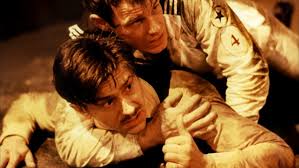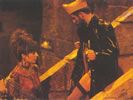Eye For Film >> Movies >> Querelle (1982) Film Review
Querelle
Reviewed by: Chris

Made shortly before his death, Querelle was the film that Fassbinder considered his best.
It opens in a bar. We learn that it is Brest, France, but it has a timeless quality, like an opium den or an early Argentinean tango-bordello. A man and a woman are dancing. She announces that the man will stay with her tonight. The woman is Lysiane, the bar owner, played by Jeanne Moreau. Her husband, behind the bar, explains he is happy with this arrangement. His own interest lies more with a leather-clad man, with whom he is in conversation.

Some sailors are talking aboard their ship. They have heard of a strange brothel. You have to play dice with the owner. If you win, you get to have his wife. If you lose, her husband gets to have you. It transpires that this brothel is the bar when Lysiane, using Tarot cards, has just read the fortune of another of her customers. She tells him of a brother who is in danger. The brother is Querelle, who is about to discover, and come to terms, with his sexuality.
Lysiane is searching for a moment of love and passion from someone who truly desires her, not regarding her as 'just a woman.' (When she says she "despises gays," she means bisexuals who regard women as second best.) Querelle's sexuality is at first ambiguous. Then there are questions of brotherly love and friendship – both of these with homoerotic overtones.
But Querelle is much more than an iconic movie for gay audiences. Fassbinder constantly puts style before content. Moreau holds her own as a deeply heterosexual presence in increasingly homosexualised scenarios. The questions are about sexuality, rather than just the specific gender orientation of the main players. Feminists have remarked how Fassbinder challenges stereotypical images of older women, for instance. Moreau, about 60 years of age at the time of this film, plays a strongly sexual woman.
Fassbinder was part of the German New Wave cinema and a highly influential stylist. As an enfant terrible he attacked established thinking. His (male, homosexual) observations about gender are as passionate as Breillat's (female, heterosexual) insights. But his purely cinematic intensities are spellbinding beyond whatever subject matter comes under his surgeon's knife. Within moments of the start of Querelle, we are drawn into a world of remarkable visual and aural richness. The complex soundtrack uses a sumptuous mix of diegetic and non-diegetic sound. Moreau singing Oscar Wilde's Ballad Of Reading Gaol. In a scene of repressed intimacy, the sound of dripping water conjures up a visceral likeness of lovemaking. Multiple voiceovers not only layer the story but openly invite us to view characters in a specific way. The religious or operatic connotations of an a cappella choir encourage a mythical reading beyond the merely human or specific.
Visually, the whole film is bathed in an orange light, as if from the setting sun, adding a feeling of sensuousness and decadence. Colonial or period furniture and lush settings, the interior of the bar enhanced with natural greenery as well as candlelight. Intertitles use quotes from Plutarch, or maybe the original Genet to infer secondary meanings, much like montage. A highly theatrical knife-fight emphasises Brechtian distance from reality, inviting us to look beyond the surface meaning. But by now we have adapted naturally to this. In some ways it is easier for modern audiences, having coped with von Trier's narrations in Dogville or Greenway's heavy intertextualisations. Fassbinder leads us gradually into a world where there is no pretence of reality, only a dreamlike experience.
At times there are almost Shakespearean touches. "He wrapped himself in prudence, waited for the angel to strike." The narrator is describing a murderer, just after the act. It prepares us for an Iago-like theme that will follow. This gritty, sometimes murderous backdrop of the sailors on shore leave also gives the non-gay viewer some respite.
The theme of murder is given a psychological depth as the murderer is viewed without ethical consideration: "Added to the moral solitude of the murderer comes the solitude of the artist, which can acknowledge no authority save that of another artist." Which is pretentious, but nevertheless thought-provoking. The phrase 'thick as thieves' means 'having no secrets from one another' but overlooks any aesthetic in the design of a robbery – or in Querelle's case – a murder.
Such quasi-philosophy is continued in the examination of Querelle's sexuality. "In some obscure way, Querelle understood that love is voluntary – you have to want it. When you don't love men, letting yourself get fucked can give you pleasure. But to fuck men, you have to love them, even if only at the moment of fucking." Querelle has succumbed passively to being rogered by Lysiane's husband, and is wondering if he can get it up to take the active role with someone he maybe cares for.
Querelle is a smorgasbord of surreal sets, textured use of sound and vision. It is determinedly experimental in its forceful way of manipulating an audience into thinking about a subject more deeply. Cineastes should delight in the opportunity to behold the work of a pioneer, although the blatantly homoerotic content and inchoate plot structure will be too much for many more mainstream audiences.
Selected in competition at the 1982 Venice Film Festival, Querelle occasioned a walk-out by the President of the Jury, who was unable to convince fellow jurors to give a prize to Fassbinder's controversial opus - a film he felt deserved an important place in the history of cinema.
Reviewed on: 11 May 2008

















